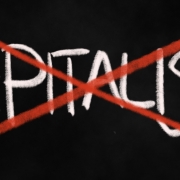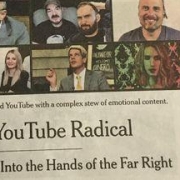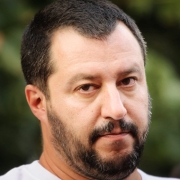Consensus Is An Outmoded Top-Down Concept. Social Media Enables Spontaneous Order To Emerge From The Competition Of Ideas.
Over several decades we’ve heard an increasing drumbeat that American politics has lost some bedrock layer of consensus that used to unite us. Generally the imagined golden age, if those behind the drumbeat make the modicum of effort required to imagine one, is some point in the mid-twentieth century after the Second World War.
The right usually frames this lost political consensus as some combination of values, family structure, and patriotism–people knowing and honoring their traditional roles in society. But younger generations mostly reject this imagined golden age out of hand, especially if delivered by government.
The left increasingly frames their lost political consensus as big benevolent organizations–big government, big business disciplined by big labor–creating and protecting jobs and livelihoods for common folk, as well as achieving big heroic things (“We won WW2,” “We landed on the moon”). I strongly suspect that if younger generations could see what this government-provided imagined golden age looked like in 2020 they would find it equally unacceptable.
Pining for an imagined golden age is probably as old as human imagination itself, but even if misguided, we ignore the drumbeat of lost consensus at our peril. Things have indeed changed, often faster than we understand them. The level of tension in our politics has undeniably increased over my lifetime–the word I most often use now is cacophony. An event like the COVID-19 pandemic has not brought consensus to our politics–it’s amplified the cacophony all the more.
The mistake virtually all consensus-seekers make is that top-down political consensus in a modern society–historically real or imagined– is a natural or desirable state in which to return. The cacophony, particularly social media ignited by the networking and information technology revolutions of the last few decades, is here to stay.
One source of increasing tension is the underappreciated problem that our political system, and equally importantly our knowledge and understanding of what our political system can be and do, has not caught up with this new technology. Everyone has both a microphone and the power to curate their own corner of public discourse–both things only one or two generations ago were the exclusive domain of oligopolistic mass media.
We continue to frame our political debates much the same way we did in that old world–big questions about systems, big top-down policy interventions, and big contests for big leadership positions. In a world with billions of microphones and curators, however, we now find ourselves trying to aggregate far too many small answers to big questions. The vital challenge in politics today is not to aggregate big answers out of the cacophony, but rather to disaggregate the questions.
Disconnection
The discord and recrimination characterizing so much of mass and social media today is not likely a problem of differing big-picture worldviews. The medieval peasant farmer, clergyman, and local aristocrat, all living mere miles from each other, probably understood the world far more differently from each other than rival political factions today.
Almost nobody would consider the lack of political cacophony either observable or endemic to that time period to be a good thing. The epically bad wars and plagues of this era are well known, but likely eclipsed by the daily business-as-usual suffering of most of the population.
The “average” medieval peasant can’t tell us what they thought about their political system–they lacked the ability to write it down. Moreover, they mostly couldn’t tell each other, let alone social elites, what they thought. Technology was at a point where transmitting complex ideas was well beyond the resources of most people, and the social order wasn’t conducive to shouting dissent in the town square.
But all of this assumes people should or would have even formulated the question, “What do you think of this political, social, religious, and cultural order that is repressing you?” The contemporaneous state of technology, knowledge, and the prevailing social order–I suspect–conspired to make such a question alien to the people of that time on many levels.
The Great Aggregation
Major thinkers and revolutions have undoubtedly played enormous roles in the many waves of political change, good and bad, since our medieval data point. But we often neglect, in relative terms, the impact of coevolutionary–perhaps corevolutionary–technological change.
Take the rise of American progressivism. The required amount of social engineering, no matter how one judges its intentions, simply could not have happened before the enormous breakthroughs in mass production, mass transportation, and mass communication in the late nineteenth and early twentieth centuries.
All of this technology seemingly rewarded scale–big collections of centrally directed people and money. In addition to winning big wars, the U.S. government attempted big humanitarian and moral change. When hiring the unemployed during the New Deal, it built big things, and relocated big numbers of laborers. When lapsing into its darker urges toward social control, it made big judgments about and big restrictions on big categories of people.
When combined with an oligopolistic mass media one can see how this political and social order, idealized though it may be, could influence the questions people could formulate about their world. What big, top-down solution exists to the next problem, what aggregate, one-size-fits-all ways can we find to better organize ourselves and cooperate?
Amity Shlaes’ recent book on the Great Society is a good document of the point when this highly scaled private/public/labor partnership slammed into a wall. Our scaled-up society turned its well-documented capabilities of monumental building, warmaking, and monumental rebuilding to ending poverty in the United States. But “ending poverty” is not suited to monumental action; there are no enemies to absorb military might, and more importantly, nothing that can absorb what author and urbanist Jane Jacobs called “cataclysmic money.” The result was the opposite of “progress.”
Postcards from the Great Disaggregation
This deeply flawed analogy, that a nation-state that can accomplish monumental things should also be able to change and harness complex social forces if it only has the will, is still very much with us today. One hears not just echoes but nearly identical thinking regarding the environment, poverty and unemployment, and pandemic response.
Combining this already-outdated approach with the microphones-and-curators explosion of social media yields a particularly wicked brew. The top-down questions we ask in politics are impossible to answer, and any mostly-incorrect answer we specify is nearly impossible to implement. Instead of many small ideas that may appear trivial on their own but add up to progress, social media in this world instead generates more and more big ideas and conflicts that can’t be resolved.
Markets provide a blueprint for “disaggregating the questions” of political and social cooperation, though the state-or-market false choice is emblematic of our current confusion. In this light, simply shutting down the government is just another inappropriately big answer both impossible and unsatisfactory.
Theorists like F.A. Hayek explain why the bottom-up knowledge and action of markets yield better outcomes than planning. Others like Elinor Ostrom and Richard Cornuelle apply that logic of spontaneous order, beginning to illuminate better paths (plural, not singular) forward. The cacophony online shows that the energy to harness such possibilities is there, and such bottom-up technology may even ultimately disavow us of antiquated thinking on top-down political and social order.
Writing prior to the Great Society but about the same slum-clearance mentality that in part doomed the later initiative, Jane Jacobs captures some of the spirit of smaller questions, which individuals, neighborhoods, and other groups of free association can actually answer:
The trouble with paternalists is that they want to make impossibly profound changes, and they choose impossibly superficial means for doing so. To overcome slums, we must regard slum dwellers as people capable of understanding and acting upon their own self-interests, which they certainly are. We need to discern, respect and build upon the forces for regeneration that exist in slums themselves, and that demonstrably work in real cities. This is far from trying to patronize people into a better life, and it is far from what is done today.
We think of social media with its inescapable cacophony as a force dividing us. But the problem is our assumption that “united” means “doing and thinking the same thing.” Ironically, exactly this networked technology enables us to think and do different things while remaining connected rather than isolated, and therefore, be greater than the sum of our parts. Old ideas about our politics finding a single consensus are the true dividers.


 The data show four viral periods: 1940-1950, 1960-1985, 1990-1998, and 2000-2008. The first period encompasses World War II, a time of draft, rationing, price controls, defense contracting, and related cronyism that may in some cases have been highly profitable for hand-picked firms.The second viral period is much longer and encompasses a period including the Vietnam War and related draft, Watergate and significant social unrest.The third period includes the first Iraq war, and the fourth contains anti-capitalism protests and budding expressions of concern about income inequality as a version of the economy closer to what we know today took shape.The Ngram suggests that in seeking to communicate to her base, Senator Warren artfully chose a phrase that had gone viral before—which is to suggest that there may be an embedded tribal norm that reacts during periods when a relatively small number of people are able to build large fortunes or avoid burdens, such as the draft, as a result of government actions and favors.Oddly enough, Senator Warren and other capitalism critics seldom ask how the system got rigged and what might be done to undo the rigging. But of course, the rigging is
The data show four viral periods: 1940-1950, 1960-1985, 1990-1998, and 2000-2008. The first period encompasses World War II, a time of draft, rationing, price controls, defense contracting, and related cronyism that may in some cases have been highly profitable for hand-picked firms.The second viral period is much longer and encompasses a period including the Vietnam War and related draft, Watergate and significant social unrest.The third period includes the first Iraq war, and the fourth contains anti-capitalism protests and budding expressions of concern about income inequality as a version of the economy closer to what we know today took shape.The Ngram suggests that in seeking to communicate to her base, Senator Warren artfully chose a phrase that had gone viral before—which is to suggest that there may be an embedded tribal norm that reacts during periods when a relatively small number of people are able to build large fortunes or avoid burdens, such as the draft, as a result of government actions and favors.Oddly enough, Senator Warren and other capitalism critics seldom ask how the system got rigged and what might be done to undo the rigging. But of course, the rigging is 






